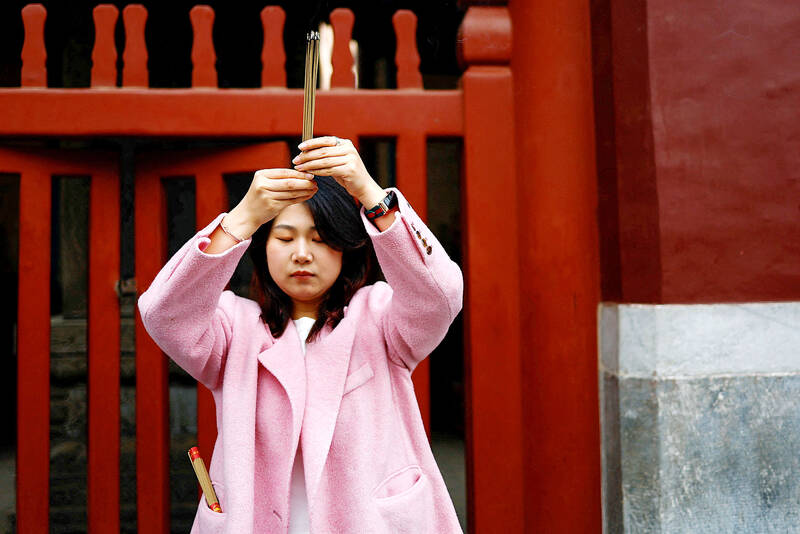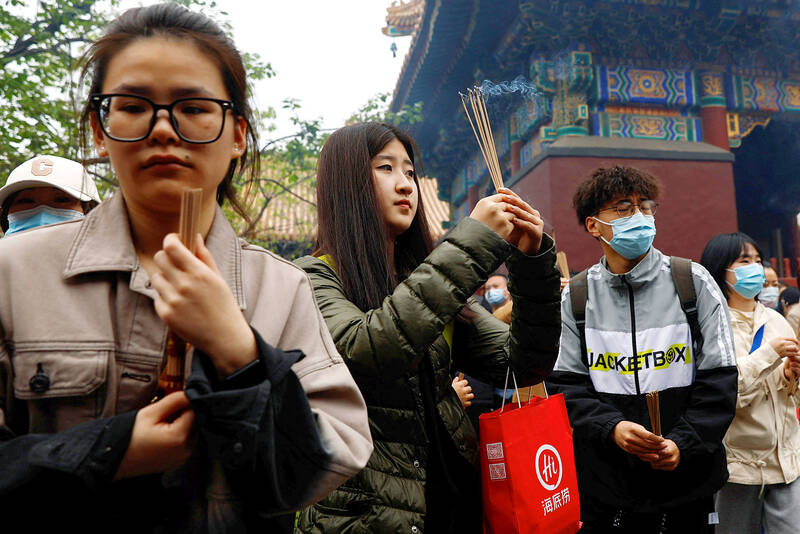Pass my exams. Meet Mr Right. Get rich. Pinned to a board by the entrance of a dimly lit fortune telling bar in Fengtai, an urban district in the south of Beijing, handwritten notes reveal the inner worries of customers coming for cocktails with a side of spiritual salvation.
One As All is one of several fortune-telling bars to have opened in Beijing, Shanghai and other Chinese cities in recent years. Hidden on the 12th floor of a commercial building, the bar serves a wide range of drinks starting at an auspicious 88 yuan (NT$357) — eight is considered to be lucky number in China.
As well as enjoying a sundowner with a view over Beijing’s skyline, customers can consult the in-house fortune teller who specializes in qiuqian (求籤, “Chinese lottery sticks”), an ancient style of divination often found in Taoist temples. From a private side-room, the smell of incense burning in front of a genuine Taoist shrine wafts into the bar.

Photo: Reuters
Derrex Deng, a 20-year-old student-cum-savant, interprets the lottery sticks for customers. Adorned with jade jewelry, his nails manicured with sparkly black and white cats, Deng is a decidedly Gen Z fortune teller. He first felt a mystical calling when he was three or four years old and started seeing spirits, he says. “Everybody trusted me, because I was so correct in telling them the truth in a direct way.”
To divine the future with qiuqian, customers pose a question before pulling a flat wooden stick from an intricately carved cylinder. Each stick is engraved with numerals and texts, which Deng interprets.
His divination skills are as Gen Z as his fashion sense. Interpreting a stick drawn in response to a question about how to improve communications with an overseas relative, he suggests using more emojis in text messages.

Photo: Reuters
ECONOMIC WORRIES
Worries about relationships and jobs are hardly unique to China. But as the country grapples with slowing economic growth, many young people are feeling particularly anxious about the future. So some are turning to xuanxue (玄學, “mysticism”). Cece, an astrology app backed by Tencent, has been downloaded more than 100 million times. The trend has been dubbed the “spiritual economy.”
“The most obvious sign of economic downturn is that, a few years ago, it felt like hardly anyone believed in metaphysics or fortune telling. But in the past two years, such beliefs have clearly become more common,” wrote one Weibo user.
“Drinking and so-called mysticism have something in common, especially in the current environment, when everyone is under a lot of pressure,” says Ma Xu, 33, co-owner of One As All, which opened last April. “They both give people an outlet for their emotions or a way to vent.” As a Taoist believer himself, Ma also wanted to accrue good karma for the afterlife by opening a bar that could lift people’s spirits.
An economic downturn might seem like an odd time to open a bar. But Ma disagrees. “Now the economy is going down, people can’t buy expensive things, such as travelling abroad. But they can come and drink a glass of wine and chat all night.” Plus, he says, as a Taoist he’s not focused on making a lot of money.
“Before we used to go to temples to do qiuqian,” says Dong Boya, 29, who works in public relations. “But this combination of drawing sticks and having a drink is interesting.”
Dong and her friends have come to One As All armed with questions about how to find love and get rich. Neither is easy in Beijing, they say. “The way to make money fast is by breaking the law. The best ways are already written in the criminal law. Or you need to know someone,” jokes Hu Jiahui, 30, who works in artificial intelligence.
Qiuqian is one of several types of Chinese fortune telling to be enjoying a resurgence among young city-dwellers. While there is some interest in Western-style divination such as tarot, it lacks the cultural resonance of Chinese traditions.
“Tarot comes from overseas, so I treat it with some suspicion,” says Ning Ning, 37. She prefers Taoist or Buddhist fortune telling.
A DELICATE BALANCE
Yaling Jiang, a consumer trends analyst, says the interest in Chinese-style fortune telling can be connected to a rising sense of cultural confidence. In recent months, several Chinese brands or products have gone global, from Labubus to DeepSeek. Ne Zha 2, an animated film based on ancient mythology, broke worldwide records for its takings in the Chinese box office. “The young audience is starting to connect to traditional Chinese culture,” says Jiang.
But mysticism occupies a sensitive place in Chinese society. The Chinese Communist Party (CCP) is officially atheist and has repeatedly cracked down on what it describes as superstitious beliefs.
Last year, state media reported that nearly 300 people had been “criminally dealt with” since 2018 for activities relating to spiritualism, with individuals sentenced to up to 17 years in prison. Still, many people maintain individual beliefs in Taoism, Buddhism and other types of spirituality, and praying to deities or ancestors for good luck and guidance is common.
Ma, the co-owner of One As All, says that he’s careful to stay on the right side of the “clear red line” of government controls. The bar doesn’t charge for qiuqian, and he also reminds customers not to be superstitious. “There’s big a difference between having a belief and being superstitious,” he says.
In China’s current economic predicament, more corporeal factors may create a space for fortune-telling bars. Consumer confidence is at historic lows and the government is desperate to get people spending more, especially as the part of the economy that has traditionally propped up growth, exports, is under pressure from the US-China trade war.
Any trend that gets people spending is likely to be welcomed by the authorities, says Jiang. “If the final outcome is that it drives consumption, I don’t think it will cause any backlash.”

Every now and then, it’s nice to just point somewhere on a map and head out with no plan. In Taiwan, where convenience reigns, food options are plentiful and people are generally friendly and helpful, this type of trip is that much easier to pull off. One day last November, a spur-of-the-moment day hike in the hills of Chiayi County turned into a surprisingly memorable experience that impressed on me once again how fortunate we all are to call this island home. The scenery I walked through that day — a mix of forest and farms reaching up into the clouds

With one week left until election day, the drama is high in the race for the Chinese Nationalist Party (KMT) chair. The race is still potentially wide open between the three frontrunners. The most accurate poll is done by Apollo Survey & Research Co (艾普羅民調公司), which was conducted a week and a half ago with two-thirds of the respondents party members, who are the only ones eligible to vote. For details on the candidates, check the Oct. 4 edition of this column, “A look at the KMT chair candidates” on page 12. The popular frontrunner was 56-year-old Cheng Li-wun (鄭麗文)

“How China Threatens to Force Taiwan Into a Total Blackout” screamed a Wall Street Journal (WSJ) headline last week, yet another of the endless clickbait examples of the energy threat via blockade that doesn’t exist. Since the headline is recycled, I will recycle the rebuttal: once industrial power demand collapses (there’s a blockade so trade is gone, remember?) “a handful of shops and factories could run for months on coal and renewables, as Ko Yun-ling (柯昀伶) and Chao Chia-wei (趙家緯) pointed out in a piece at Taiwan Insight earlier this year.” Sadly, the existence of these facts will not stop the

Oct. 13 to Oct. 19 When ordered to resign from her teaching position in June 1928 due to her husband’s anti-colonial activities, Lin Shih-hao (林氏好) refused to back down. The next day, she still showed up at Tainan Second Preschool, where she was warned that she would be fired if she didn’t comply. Lin continued to ignore the orders and was eventually let go without severance — even losing her pay for that month. Rather than despairing, she found a non-government job and even joined her husband Lu Ping-ting’s (盧丙丁) non-violent resistance and labor rights movements. When the government’s 1931 crackdown